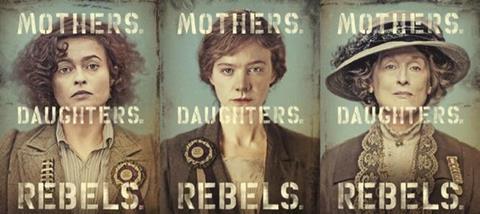
This isn’t a story about the most famous suffragette heroine Emmeline Pankhurst (Meryl Streep), but rather an ode to the faceless thousands who campaigned alongside her. It’s for this reason that the main protagonist Maud Watts (Carey Mulligan) is a fictional amalgamation of multiple real life suffragettes.
Over the course of the 106 minutes Maud Watts transforms from an apathetic washerwoman, into a leading figure within the suffragette movement. As she becomes this rebel with a cause, Watts fights increasingly hard for what she believes in, in spite of the difficulties and tragedies it leads to. She loses her family and is imprisoned more than once. But she perseveres, demonstrating an inspiring and remarkable willingness to suffer for what is right.
Suffragette was the first commercial film to be shot inside the Houses of Parliament, and each setting – whether prison, factory or a bustling Oxford Street – is vividly portrayed on screen. The film will be well used as an educational tool, and although the mid-section lags, most of it is engaging, thought provoking, and at times even moving.
Throughout the film we see the dramatic effect that limiting women’s freedom has on society. Female workers are paid less than men for doing the same job. Their views are often silenced, or overlooked. Women don’t even have legal rights over their own children. All bar one of the male characters on screen are revealed to be deeply flawed. They are rapists and abusers.
The film is set 50 years into the campaign for women’s votes. The suffragettes are becoming increasingly frustrated at the lack of progress their political campaigning is bringing. Having fought such a long battle with their words but achieved nothing, some suffragettes resort to civil disobedience and violence. Watts blows up post-boxes, tears down telephone wires, and even bombs the home of Lloyd George, then Chancellor of the Exchequer.
Was it these acts of destruction (and at times even terror) that finally changed the establishment’s mind and helped give women the vote? The filmmakers suggest these controversial tactics were successful, but whether they were ethical is for the viewer to decide. The debate over women’s votes is now thankfully over. But we may consider whether the ‘end’ of universal suffrage justifies the ‘means’ of civil disobedience and violent behaviour. Non-violent struggle maybe a nice idea, but, as Suffragette suggests, when it doesn’t work, frustration can build and morph into the easier option of violent resistance.
Edith Ellyn – who was responsible for the first act of vandalism within the suffrage movement - is portrayed on screen by Helena Bonham Carter. The actress is the great-granddaughter of Herbert Henry Asquith, who was Prime Minister from 1908 to 1916 and a staunch opponent of votes for women. When the credits roll, we’re reminded that universal suffrage in the UK was not achieved until 1928. Italy gave women the vote in 1945 and Switzerland waited until 1971. Despite promises to the contrary, women have to this day yet to vote in Saudi Arabia.
There will be many who use this film as inspiration and fuel for their own advocacy efforts. Campaigns against gender pay gaps and phrases such as ‘everyday sexism’ and ‘glass ceiling’ come to mind. We may be over 100 years on from the suffragettes but the vision of a fair and equal society has yet to be realised.
Aside from the obvious historical portrayal of one of Britain’s greatest internal struggles, this film is also about taking a cause and fighting hard for it. Christian cinema-goers may draw inspiration from this, mindful that taking on the cause of Christ is not a popular decision in today’s world. British Christians are not persecuted for their faith today in the same way British suffragettes suffered for their beliefs. But globally, Christians are dying for the cause of Christ, just as some suffragettes also paid the highest price for their beliefs. Suffragette should remind Christians that true perseverance now will bring enormous benefits in the future. As Paul said, ‘What we suffer now is nothing compared to the glory he will reveal to us later’. (Rom 8:18 NLT)
To receive a free copy of Premier Christianity magazine click here




























